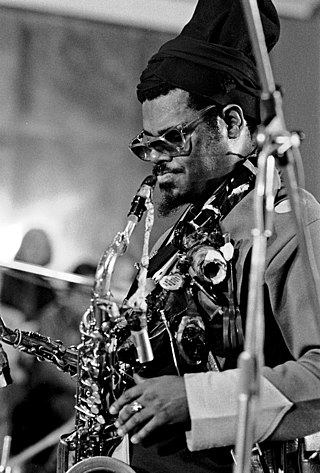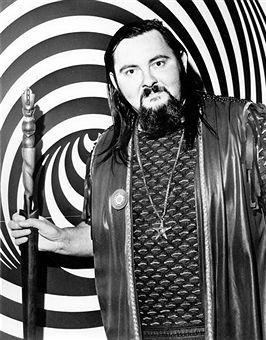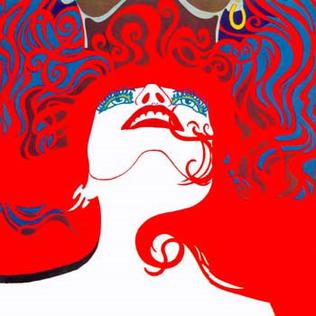Related Research Articles

Blues is a music genre and musical form that originated amongst African-Americans in the Deep South of the United States around the 1860s. Blues has incorporated spirituals, work songs, field hollers, shouts, chants, and rhymed simple narrative ballads from the African-American culture. The blues form is ubiquitous in jazz, rhythm and blues, and rock and roll, and is characterized by the call-and-response pattern, the blues scale, and specific chord progressions, of which the twelve-bar blues is the most common. Blue notes, usually thirds, fifths or sevenths flattened in pitch, are also an essential part of the sound. Blues shuffles or walking bass reinforce the trance-like rhythm and form a repetitive effect known as the groove.

Rahsaan Roland Kirk, known earlier in his career simply as Roland Kirk, was an American jazz multi-instrumentalist who played tenor saxophone, flute, and many other instruments. He was renowned for his onstage vitality, during which virtuoso improvisation was accompanied by comic banter, political ranting, and the ability to play several instruments simultaneously.

Geoffrey Arnold Beck was an English guitarist. He rose to prominence as a member of the rock band the Yardbirds, and afterwards founded and fronted the Jeff Beck Group and Beck, Bogert & Appice. In 1975, he switched to an instrumental style with focus on an innovative sound, and his releases spanned genres and styles ranging from blues rock, hard rock, jazz fusion and a blend of guitar-rock and electronica.

John Brumwell Mayall was an English blues and rock musician, songwriter and producer. In the 1960s, he formed John Mayall & the Bluesbreakers, a band that has counted among its members some of the most famous blues and blues rock musicians. A singer, guitarist, harmonica player, and keyboardist, he had a career that spanned nearly seven decades, remaining an active musician until his death aged 90. Mayall has often been referred to as the "godfather of the British blues", and was inducted into the Rock and Roll Hall of Fame in the musical influence category in 2024.

New Orleans rhythm and blues is a style of rhythm and blues that originated in New Orleans. It was a direct precursor to rock and roll and strongly influenced ska. Instrumentation typically includes drums, bass, piano, horns, electric guitar, and vocals. The style is characterized by syncopated "second line" rhythms, a strong backbeat, and soulful vocals. Artists such as Roy Brown, Dave Bartholomew, and Fats Domino are representative of the New Orleans R&B sound.
Electric blues is blues music distinguished by the use of electric amplification for musical instruments. The guitar was the first instrument to be popularly amplified and used by early pioneers T-Bone Walker in the late 1930s and John Lee Hooker and Muddy Waters in the 1940s. Their styles developed into West Coast blues, Detroit blues, and post-World War II Chicago blues, which differed from earlier, predominantly acoustic-style blues. By the early 1950s, Little Walter was a featured soloist on blues harmonica using a small hand-held microphone fed into a guitar amplifier. Although it took a little longer, the electric bass guitar gradually replaced the stand-up bass by the early 1960s. Electric organs and especially keyboards later became widely used in electric blues.
Jazz fusion is a popular music genre that developed in the late 1960s when musicians combined jazz harmony and improvisation with rock music, funk, and rhythm and blues. Electric guitars, amplifiers, and keyboards that were popular in rock began to be used by jazz musicians, particularly those who had grown up listening to rock and roll.

The Jeff Beck Group was a British rock band formed in London in January 1967 by former Yardbirds guitarist Jeff Beck. Their innovative approach to heavy-sounding blues, rhythm and blues and rock was a major influence on popular music.
Blues rock is a fusion genre and form of rock music that relies on the chords/scales and instrumental improvisation of blues. It is mostly an electric ensemble-style music with instrumentation similar to electric blues and rock. From its beginnings in the early to mid-1960s, blues rock has gone through several stylistic shifts and along the way it inspired and influenced hard rock, Southern rock, and early heavy metal.

Norman Jeffrey Healey was a Canadian blues, rock and jazz guitarist, singer and songwriter who attained popularity in the 1980s and 1990s. He reached No. 5 on the U.S. Billboard Hot 100 chart with "Angel Eyes" and reached the Top 10 in Canada with the songs "I Think I Love You Too Much" and "How Long Can a Man Be Strong".

Richard Malden Heckstall-Smith was an English jazz and blues saxophonist. He played with some of the most influential English blues rock and jazz fusion bands of the 1960s and 1970s. He is known for primarily playing tenor, soprano, and baritone saxophones, as well as piano, clarinet and alto saxophone.

John Laird Abercrombie was an American jazz guitarist. His work explored jazz fusion, free jazz, and avant-garde jazz. Abercrombie studied at Berklee College of Music in Boston, Massachusetts. He was known for his understated style and his work with organ trios.

Graham John Clifton Bond was an English rock/blues musician and vocalist, considered a founding father of the English rhythm and blues boom of the 1960s.

Climax Blues Band are a British blues rock & pop band that has released 22 albums. "Couldn't Get It Right" reached No. 10 on the UK Singles Chart and No. 3 on the Billboard Hot 100 in 1977. "I Love You" peaked on the Billboard chart at No. 12 in 1981.

Canadian blues is the blues and blues-related music performed by blues bands and performers in Canada. Canadian blues artists include singers, players of the main blues instruments: guitar, harmonica, keyboards, bass and drums, songwriters and music producers. In many cases, blues artists take on multiple roles. For example, the Canadian blues artist Steve Marriner is a singer, harmonica player, guitarist, songwriter and record producer.

Robert Tench was a British vocalist, guitarist, sideman, songwriter and arranger.
The Gass was a rock band formed in May 1965 by Robert Tench, Godfrey McLean, and Errol McLean. They were managed by Rik Gunnell and Active Management. The band fused melodies with soul, Latin influences, blues and progressive rock often employing complex rhythms with an eclectic mix of other influences.

Catch My Soul is a rock musical produced by Jack Good, loosely adapted from Shakespeare's Othello. The character of Iago had originally been played by Jerry Lee Lewis in the US production which had closed in 1968. The UK production of the show was a showcase for the talents of Lance LeGault, P. P. Arnold, P.J. Proby and an introduction to the rock musician Robert Tench with the band Gass.

Of Human Feelings is an album by American jazz saxophonist, composer, and bandleader Ornette Coleman. It was recorded on April 25, 1979, at CBS Studios in New York City with his band Prime Time, which featured guitarists Charlie Ellerbee and Bern Nix, bassist Jamaaladeen Tacuma, and drummers Calvin Weston and Coleman's son Denardo. It followed the saxophonist's failed attempt to record a direct-to-disc session earlier in March of the same year and was the first jazz album to be recorded digitally in the United States.
Steuart Liebig, born July 25, 1956, is an American bassist and composer of modern creative jazz and the free improvisational music. He plays 6-string bass guitars.
References
- 1 2 Yanow, Scott (2013). The Great Jazz Guitarists. San Francisco: Backbeat. p. 11. ISBN 978-1-61713-023-6.
4. Cook, Richard & Morton, Brian (2008). The Penguin Guide To Jazz Recordings 9th Edition. London: pp 48–49. ISBN 978-0-141-03401-0.